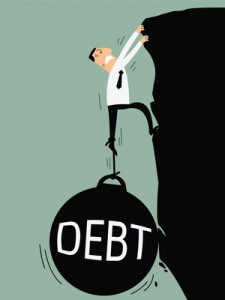Looking at an Individual Voluntary Arrangement (or IVA) through the eyes of the person in debt reveals the pros and cons of the process. Once an IVA is accepted at the meeting of creditors, you can look forward to enjoying a considerable number of advantages, provided you stick to the agreed terms for the duration of the IVA. As with any Insolvency solution, there are also some cons to be aware of in an IVA, especially if the IVA should fail. We have outlined the advantages and drawbacks in this article.
What are the Pros of an IVA?
An IVA provides relief from your unsecured debts, whilst allowing you to repay as much of your debt as possible to your creditors.
In an IVA, you make affordable monthly payments over a period of 5 years. You can also pay by a single lump sum payment over a shorter term.
By doing an IVA, you can avoid the stigma of bankruptcy and its associated restrictions and obligations.
In an IVA, you are generally able to keep control of your assets, such as your car and your home (so long as any payments are within reason).
You can stay in your job or if you are self-employed, you can continue trading and remain in business. However, some professions may be adversely affected in an IVA. You can check this out with your employer, professional body or by simply contacting us.
Any remaining unpaid debt is written off on completion, so you will be debt free at the end of the IVA (usually five years).
All interest, charges and penalties on the unsecured debts will be frozen in the IVA.
Because an IVA is a formal agreement, your creditors must cease contact of demanding payment once your IVA is agreed. This includes phone calls, texts, letters, e-mails and faxes as well as halt all activities by bailiffs and debt collectors.
Your creditors will be legally bound by the terms of the IVA once it is accepted, including any creditors who may have voted to reject the IVA proposal.
Court involvement in dealing with debt is minimised and all court action by creditors relating to debt recovery will be stopped when in an IVA.
You preserve your right to privacy by avoiding publicity in newspapers, although the IVA information is put up on the Insolvency Register.
There may be a certain amount of flexibility in an IVA, particularly if adverse circumstances arise during the life of the IVA when the terms of payment may be varied with the consent of creditors.
You can begin to repair your impaired credit rating at the end of the IVA term and in due course you will be enabled to borrow money again once credit ratings have been restored.
Significant amounts of debts are usually repaid in an IVA, typically between 20% and 50% as opposed to bankruptcy where as little as nothing might be repaid. This is advantageous to creditors and should help in getting a realistic proposal accepted.
What are the Cons of an IVA?
There are costs involved in an IVA . These costs go towards the supervision and management costs of the IVA. However, these costs are paid out of your monthly affordable payments to the IVA and are not additional charges.
If creditors reject the IVA proposal, they are again free to pursue other legal actions such as petitioning for your bankruptcy, obtaining court judgments against you and registering charges on your assets. Please note, as an ethical company, we will not put forward an IVA proposal on your behalf if it is not your best option or if it is likely to fail, as this will not benefit you, your creditors or ourselves. We only put through an IVA proposal if we believe it will be successful.
In order for an IVA to be accepted you need a high level of creditor acceptance of the IVA proposal. At least 75% by debt value, of voting creditors must accept your proposal for the IVA to be approved.
Creditors’ may suggest or demand modifications to an IVA proposal. For instance, they may seek to increase your monthly contribution into the IVA thus increasing the risk that the IVA may fail during its term of supervision if your are unable to sustain the enhanced level of contributions.
The reduced limits on living expenses which creditors may impose on you, can again increase the possibility that an IVA may fail in supervision if you cannot reasonably live within the limits imposed.
The IVA term usually lasts five years compared to Bankruptcy, where you can be discharged after one year. There is no time-related automatic discharge from an IVA. However, in bankruptcy, you may have to make income payments for up to three years, with payments continuing after discharge.
There is a prohibition on any borrowing during the term of the IVA, except with the express permission of the supervisor and creditors.
There is a cap on fees that creditors impose on Insolvency Practitioners, thus making them reluctant to put forward commercially unviable IVAs.
Your credit rating can be impaired during the term of the IVA and even for a while after completion of the IVA. It is recorded for six years from the commencement of the IVA or from when any default on credit was first registered.
If you have equity in your home or you own other significant assets you may be required to release some or all of that value and contribute it to the IVA for it’s term. An IVA is not suitable for any one. To enter into an IVA, your unsecured debts must be at least £10,000 and disposable income must be at least £120 per month.
There is always a risk that the IVA may fail during its supervision period if you are unable to sustain contributions as required and agreed and where creditors do not accept variation proposals for reduced payments even over an extended term. You may be unable to stick to the set payments and more regimented living over five years or your financial circumstances may seriously deteriorate and in the end you may be forced into bankruptcy.
Further IVA Reading
We have a lot more information about IVAs on our website. Read our IVA faqs if you would like to know more, or get in touch to speak with an IVA Expert.
Written by Paddy Byrne 16/08/2013


